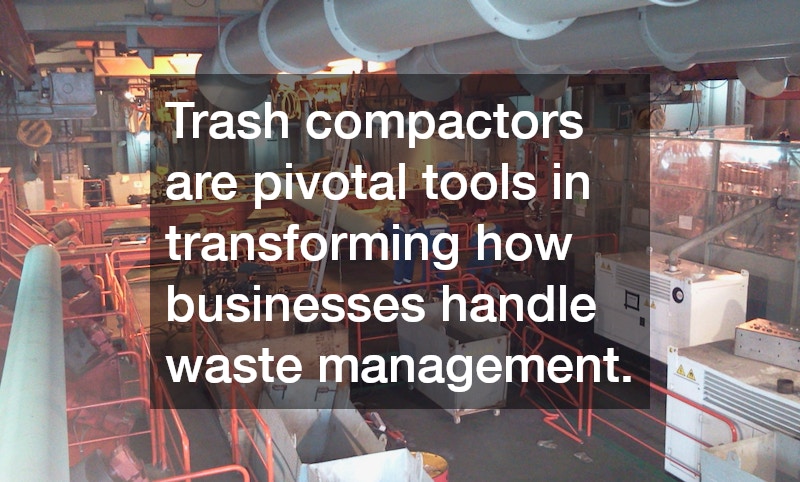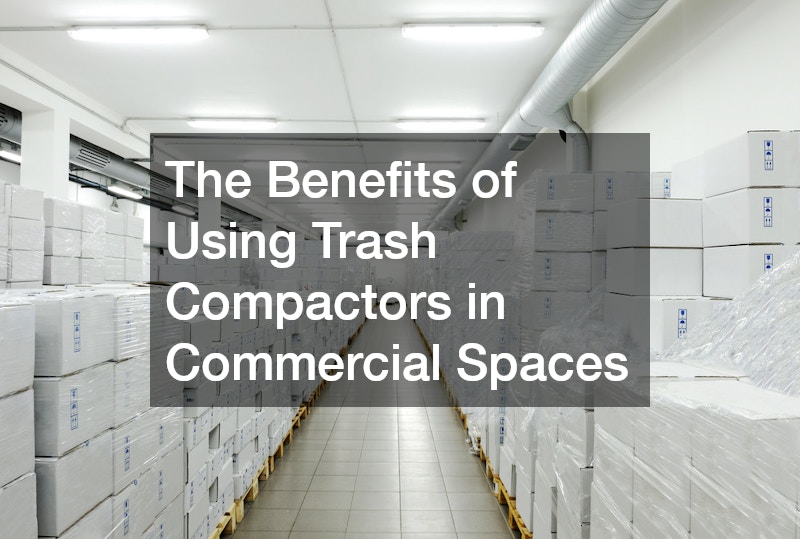Efficient waste management is a pressing concern for many businesses today. With the growing emphasis on sustainability and cost-cutting, commercial entities are constantly looking for innovative strategies to manage waste more effectively. One such solution that has gained significant traction is the use of trash compactors. These machines provide a host of benefits that range from reduced waste volume to long-term cost savings.
In this article, we’ll explore in detail the multifaceted advantages of employing trash compactors in commercial spaces.
Reducing Waste Volume
Trash compactors are renowned for their ability to significantly reduce waste volume. By compressing waste materials, these machines allow businesses to store more trash in less space, effectively minimizing the need for frequent waste pick-ups. This not only reduces the operational burden on staff managing waste but also decreases the frequency of hiring waste collection services, which can accumulate significant costs over time. Additionally, the space-saving feature of trash compactors means that businesses can allocate more floor area to revenue-generating activities rather than waste storage. Ultimately, by minimizing waste volume, trash compactors contribute to a more efficient and organized waste management system.
Furthermore, reducing waste volume has a substantial environmental impact, as it translates to fewer landfill visits and less land area dedicated to waste. With reduced visits to the landfill, businesses contribute to lowering carbon footprints associated with frequent transportation. Compacting trash also decreases the likelihood of pests and unpleasant odors associated with larger volumes of waste. Businesses can therefore maintain a cleaner and more hygienic environment for customers and staff. In an age where sustainability is a key differentiator, utilizing trash compactors showcases a business’s commitment to environmentally friendly practices.
Saving Money
Implementing trash compactors leads to substantial cost savings in various dimensions of business operation. First, the lower volume of waste reduces the frequency and cost of waste pickups, a significant expense for many commercial businesses. Waste collection services usually charge based on the number of collections or the volume of waste; hence, reducing either leads to direct financial savings. Furthermore, trash compactors can also minimize labor costs, as staff require less time to manage and empty trash bins. This efficiency allows staff to focus on other business-critical activities, adding value to the company’s operations.
Additionally, companies using trash compactors often experience lowered operational costs over time. With fewer bins to manage and less waste targeting transportation infrastructure, maintenance and wear-related expenses are curtailed. Although there is an upfront cost associated with purchasing a trash compactor, businesses generally experience a quick return on investment due to these long-term savings. Many businesses report recouping their initial investment within just a year or through reduced waste collection fees and operational efficiencies. By positioning waste management as an investment rather than a cost, businesses can leverage these savings for further growth and development.
Enhancing Efficiency
Trash compactors play a significant role in enhancing operational efficiency. By installing these machines, businesses can streamline their waste management procedures, avoiding the pitfalls associated with conventional waste disposal methods. For instance, compactors reduce the number of waste bins needed within premises, leading to a decluttered and more navigable workspace. This additional efficiency translates to better time management, as employees spend less time coordinating waste disposal and engaging more productively in core business activities. A well-organized waste system also supports regulatory compliance, often a stringent requirement in commercial environments.
Furthermore, trash compactors contribute positively to the visual appeal and aesthetics of commercial spaces. When waste is effectively compacted and contained, it significantly minimizes the chances of overfilled bins and spills that can detract from a clean and professional image. Keeping a tidy premises can enhance the customer experience, potentially increasing patronage and reflecting well on a brand’s image. Sectors such as retail, hospitality, and food service, where customer impression matters greatly, can benefit significantly from these visual enhancements. The discreet nature and compact size of trash compactors also allow for strategic placements within commercial spaces, promoting an unobtrusive integration into business operations.
Trash compactors are pivotal tools in transforming how businesses handle waste management. From reducing waste volume and realizing significant cost savings to enhancing efficiency and aesthetics, these machines provide multifaceted advantages. Particularly in large-scale commercial environments, trash compactors streamline operations, optimize space usage, and reduce the environmental footprint significantly. In an era where businesses are required to prioritize sustainability and operational efficiency, trash compactors emerge as an indispensable investment. By integrating these solutions into their waste management strategies, commercial entities can achieve long-term sustainability goals while also fostering a cleaner and more productive business environment.


